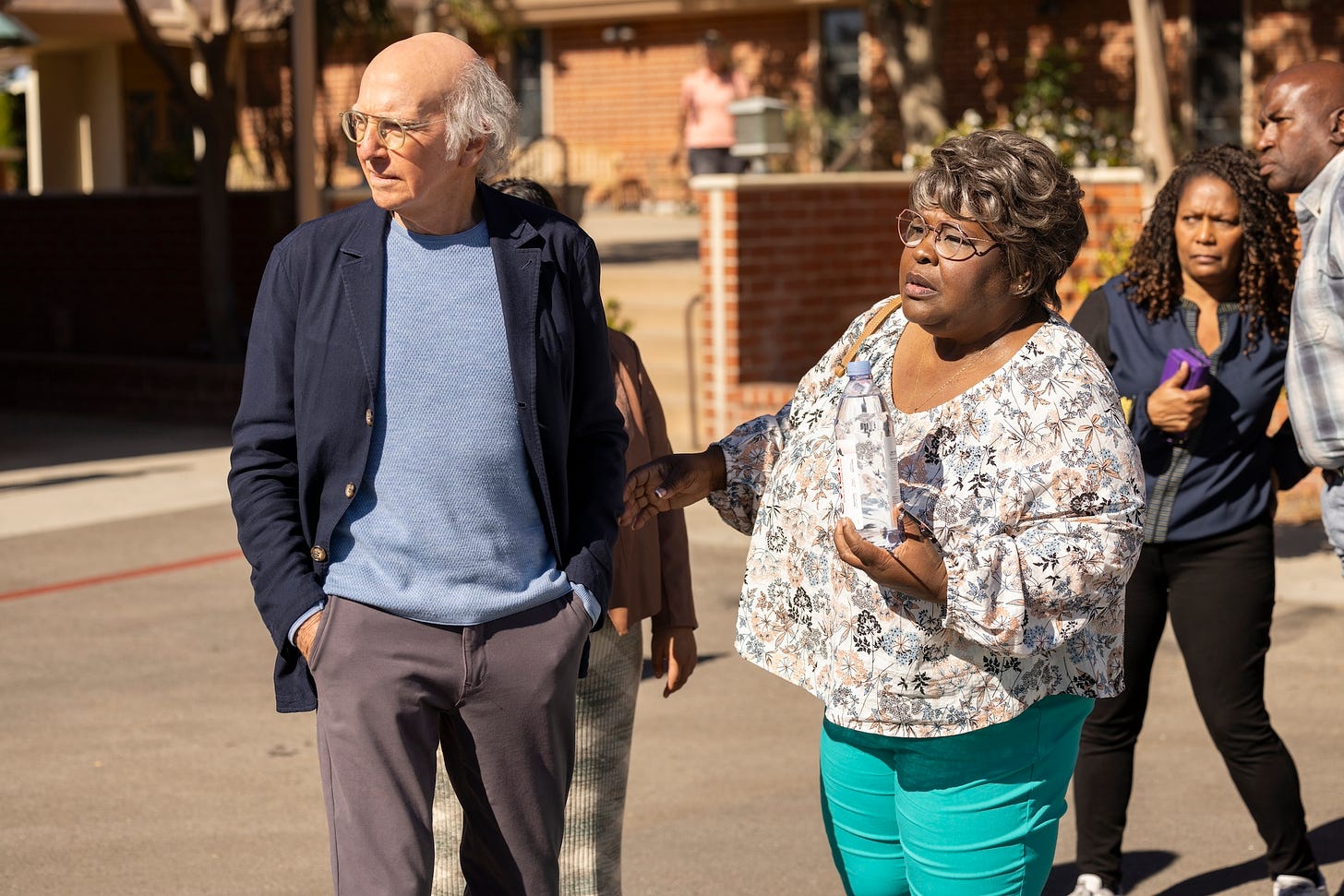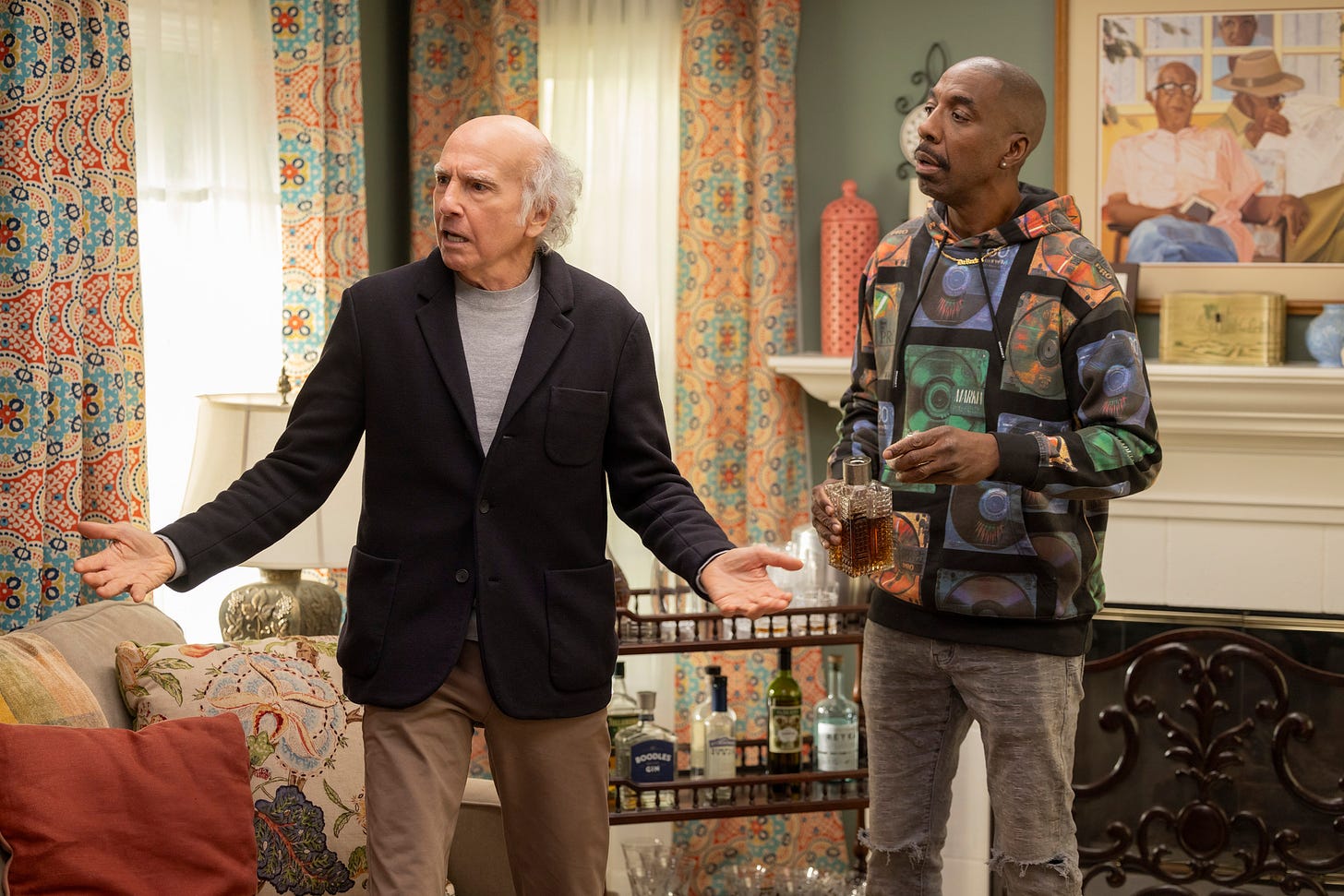Review: Curb Your Enthusiasm, “Atlanta” | Season 12, Episode 1
Larry David’s status-quo-challenging sitcom returns for a final cringe-filled season
Welcome to Episodic Medium’s coverage of the final season of HBO’s Curb Your Enthusiasm. As always, this first review is free for all, but subsequent reviews will be exclusively for paid subscribers. To get future reviews (full schedule here) and more for $5 a month, sign up now.
For the past few years, the way I’ve felt about new seasons of Curb Your Enthusiasm is similar to how I’ve felt about new seasons of It’s Always Sunny in Philadelphia. I’m always happy to have new episodes of two of my favorite shows, both of which regularly still turn out episodes that make me laugh. And yet I can never totally shake off the feeling that this isn’t quite the show it once was. I’ve watched every episode of the first eight seasons at least a few times, but it’s rare I find myself wanting to re-watch an episode from, say, season eleven.
Again, that’s not to say I don’t enjoy this show anymore, or that I’m not really looking forward to writing about how it goes out. I go back and forth about which of the post-2017 seasons are best, but most of the episodes have at least a few chuckles, and occasionally a new piece of Curb lore drops that feels instantly classic. I regularly reference “side sitting” decorum from season ten, along with the central concept of “The Ugly Section.” Season eleven’s “The Watermelon,” with the story of Larry helping out a “decent Klansman” after spilling coffee on his robe before a big rally, showed that David’s willingness to go there hasn’t diminished with time.
I’m aware that my vast preference for the first eight seasons isn’t a universally agreed-upon opinion; I’ve seen lots of lists rank season ten above eight, for example, and some viewers don’t feel a drop-off in quality at all. Like It’s Always Sunny, everyone has their own idea which episodes are hits and which are misses. For me, “Atlanta” doesn’t touch those episodes I mentioned above; it’s not one of the worst episodes of Curb, but I’d call it lower-middle-of-the-pack in relation to the last few seasons.
David has never been afraid to repeat storylines—plenty of Curb plots began as Seinfeld plots—but certain jokes feel either familiar or slightly outdated here. Even just on a scene-by-scene basis, this feels much broader than the show I once fell in love with, partly due to the number of “Larry yelling” scenes. The fictional Larry David was once the ideal comedic antihero: sure, he acted inappropriately, but a good chunk of the time, his intentions were noble, born of a frustration with the unwritten rules of society. Recently, Larry has morphed into a slightly less interesting type of grumpy old man.
Besides the first, every season of Curb has featured some central story. And while the final scene of this premiere hints at the overarching narrative of these final ten episodes, it’s worth noting that there’s quite a bit of carryover from last time. When we pick up, Young Larry is a big success, with Maria Sofia (an always-game Keyla Monterroso Mejia) the breakout star. And Larry’s still counting the days until he’ll be freed of his obligation to dating Irma Kostroski (Tracey Ullman), who can’t stop annoying him wherever she goes—especially with her recent habit of singing the iconic J.G. Wentworth jingle.
“Atlanta” does a nice enough job reintroducing most of the cast (no Cheryl yet), but it’s also not the most typical episode, with only the first couple scenes taking place in L.A. For most of the episode, we’re in Atlanta, where Larry has agreed to cordially mingle at the birthday party of a rich African businessman named Michael Fouchay (Sharlto Copley). It’s also a great excuse to check back in with Leon’s Auntie Rae (Ellia English), whom we haven’t seen at all since early season seven in 2009. It’s legitimately heartwarming to see her and Larry reunite, though it’s temporarily (and characteristically) interrupted with Larry’s furious reaction to her head stretching out his glasses.
The birthday party itself is a mixed bag. The jokes about Larry and Leon’s mutual confusion over Michael identifying as “African” despite being a white South African feel a bit old, for one. It’s been 20 years now since the “Oh my god, Karen, you can’t just ask people why they’re white” moment from Mean Girls (not to mention Disney Channel’s The Color of Friendship), and the joke hasn’t evolved much since then. But the idea of a flexible, somewhat arbitrary “Brooke/Brookie rule” to specify when an affectionate nickname becomes permissible for a new friend to use? That feels more like vintage Curb territory. The only issue, really, is that the episode doesn’t go far enough with the idea; none of the supporting characters really stick around long enough to make a strong impression, and after the initial explanation of the rule, there aren’t any particularly surprising complexities or contradictions.
Copley brings a good energy to the episode, his warmth slowly turning to strained politeness and then righteous indignation on behalf of Brooke. During an unscheduled meeting about Larry’s appearance fee, Michael argues that he violated his contract by being disrespectful at the party, but the animosity soon softens as they channel South Africa’s Truth and Reconciliation Commission with an amusingly cordial mock hearing. After an episode full of grumpiness from Larry, it’s good to see him own up to having “bad energy” and identifying as “a person who hates people and yet had to be amongst them.” That’s Larry in a nutshell.
People are rarely completely immune to Larry’s charms, so it’s no surprise that sharing a nugget of self-awareness is enough to win Michael back—along with signing a shirt for his son. But like many an episode, there’s a final reversal of fortunes here that satisfyingly brings together multiple threads from throughout the episode. While venting to Maria Sofia about Michael—from his “potato” son to his insistence on calling himself African—her emotional support dog sits on his phone, butt-dialing the subject of their conversation. In their refreshingly brief final interaction, Larry simply and resignedly says, “goodbye,” one of David’s best line deliveries of the episode.
There are multiple of these ending resolutions, in three successive scenes. The cackling revenge of the hotel housekeeper is a bit over-the-top, but adequately explained by it being Ligaya’s last month here. That’s another story that feels like it could use a little more depth, but it does successfully follow the tried-and-true formula of combining Larry’s fussiness (refusing to pluck his glasses from the toilet, which is uncommonly squeamish even for him) and a heavy dose of random misfortune (unknowingly blow-drying Ligaya’s tip into the toilet) as a result of some other cause (dog slobber).
Larry’s final L of the episode comes from out of nowhere, comparatively speaking, though the episode sets it up with Auntie Rae’s voting sticker early on. In the closing seconds of the episode, Larry gets arrested for violating Georgia’s very-much-real Election Integrity Act of 2021, which, among other voting restrictions, prohibits outside groups to give free food or water to voters in line.
As far as I know, this specific provision of the law was blocked last August, but it’s still encouraging to see David’s refusal to shy away from getting political in this final season. If he manages to wring laughs out of critiquing one of the most significant anti-democratic, racially discriminatory laws in recent U.S. history, I’ll be impressed. If anyone can do it, it’s Larry David.
Stray observations
Okay, but my actual biggest laugh of the episode was during Larry’s agonizingly long, awkward walk to the hotel restaurant with an employee who insists on walking him. What sells is it the complete lack of dialogue, a rarity for this show.
Jeff dyed his hair dark, which I noticed immediately. Is this setting up a Rudy Giuliani-esque meltdown?
Larry screaming at Siri in the car feels like another slightly outdated joke, and it’s definitely an example of the comedy deriving from Larry just screaming obscenities. But I get it—Larry David screaming obscenities is always funny.
Larry impatiently taking the grieving waiter’s tray of food from him feels very reminiscent of this moment from season eight’s “The Hero.”
I enjoyed Larry’s reaction to Ligaya’s undisguised disgust with, all things considered, a pretty normal, mildly messy hotel room.
I also like Maria Sofia’s random shots at Larry, like when she calls his slobbered-on pants “basic.”
Every J. B. Smoove line delivery is great, no matter what it is, but a few of the Leon moments here could’ve used a little more time and specificity to really take off comedically—like the dick-dialing anecdote, and his one-sided feud with Maria Sofia’s dog.






Rule of thumb me have had since season one is, if someone else is breaking one of society's unspoken rules and Larry calls them out on it, it good episode. If Larry just being an asshole, then it episode me could live without.
Wholeheartedly agree with the review. While it's not great Curb, it's at least new Curb, and I'll take it. It is strange that this feels exactly like another season 11 episode, but I think Keyla Monterroso Mejia is terrific so I won't complain too much about this season not distinguishing itself from the last.